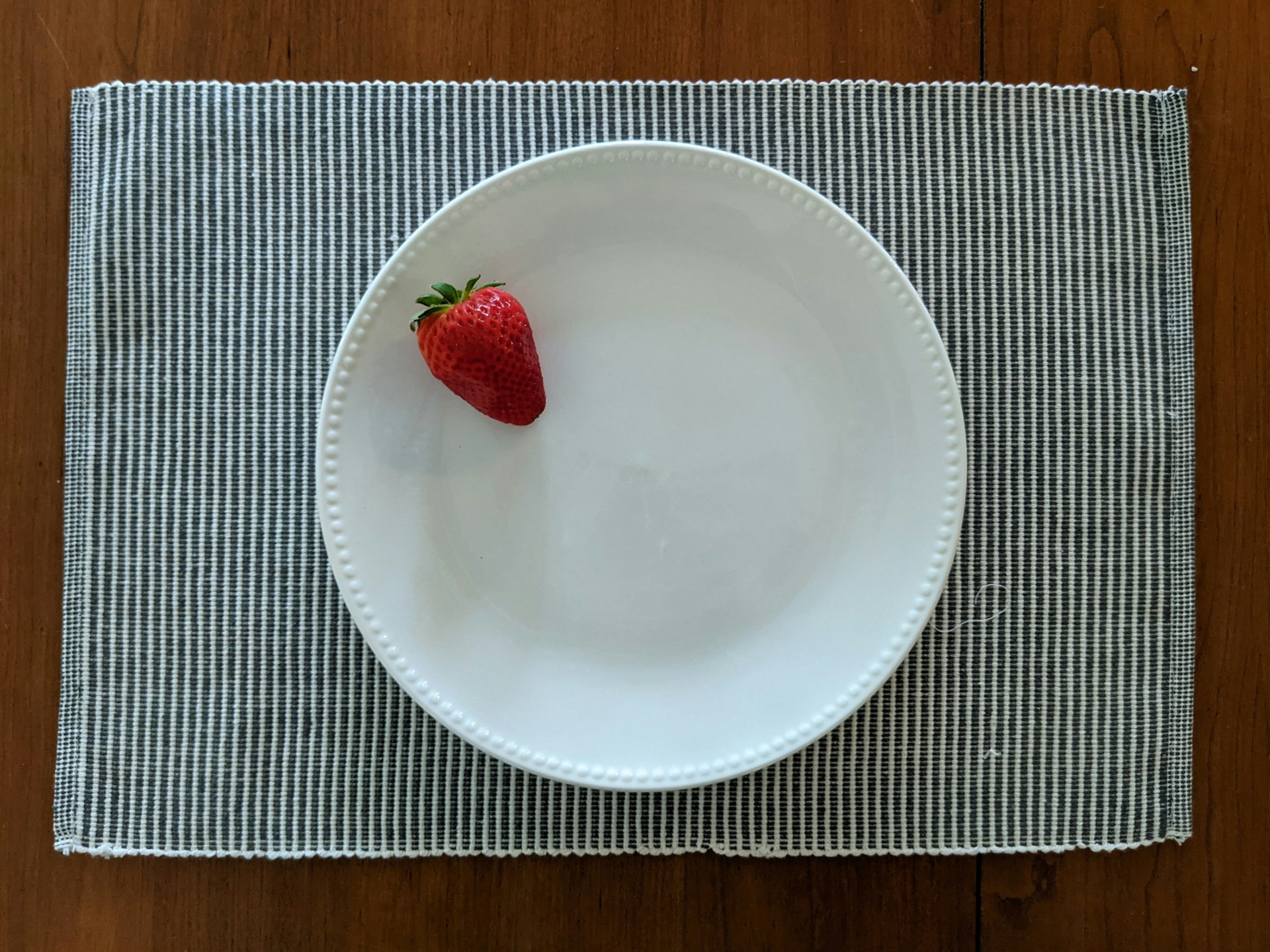Have you ever gone on a diet to try to lose weight fast, only to immediately feel overwhelmed by restrictions or cravings? Then there is the fight against hunger pangs and the lack of energy that you have to deal with. Not to mention the frustration that you feel when your progress is slow or you start to gain weight and not lose it.
There are many reasons why crash diets fail, but the most common reason is that no one can endure the harsh circumstances or terrible side effects they create. And truth be told, most of them are not considered a safe way to lose weight. Today we are going to talk about why setting a goal of losing 1 pound a week is good, attainable, and safe.
{{cta_button}}
Why Is 1 Pound A Week A SMART Goal?
According to experts, the safest rate of weight loss is one to two pounds a week. Losing weight too quickly can put stress on your body and result in unpleasant side effects like hair loss or gallstones. Also, most individuals who experience rapid weight loss using a fad diet or other extreme measures end up with rebound weight gain, which is often greater than the amount they previously lost.
If you are unfamiliar with SMART goals and the meaning of this acronym, it stands for goals that are
- Specific;
- Measurable;
- Achievable;
- Realistic;
- Time-bound.
When you start a weight loss journey, you need some type of plan, or it will be easy to get off course. If you write down your goals and post them somewhere that you can see them every day, it can help motivate you when things get a bit tough. An example of this goal might look like this:
“I want to lose 1 pound a week during the next 4 months, so I can become healthier, fit into a smaller size dress, and look great at my son's wedding.”
This goal is specific, it can be tracked, it is measurable, it can be achieved, it is not unrealistic, unlike if you set a goal to run 5 miles when you are just starting an exercise program, and it has a time by which you want to accomplish this.
Setting a goal of losing one pound a week is achievable and sustainable, allowing the time needed for you to change unhealthy behaviors into new, healthier habits. Maintaining a healthy weight requires a lifetime of making small changes and different choices.
How Many Calories Does It Take To Lose A Pound A Week?
Experts report that a pound of fat is equivalent to 3,500 calories. To lose one pound in a week, you need to burn 3,500 more calories than you consume during that week. Since everyone is different, you will have to determine the best way to create this deficit so it will result in weight loss. On average, it usually means reducing your calorie intake by about 500 calories a day. If you normally eat about 2,000 calories a day, that would mean you would need to consume around 1500 a day.
There are only two ways to create a calorie deficit; eating fewer calories or burning calories through physical activity. However, all calories are not created equal, so it is important that you are eating the right kind of calories. If you are only allotted 1,500 calories a day, you need to make sure you are getting the most mileage out of the calories you are consuming. Eating foods that are rich in fiber makes your metabolism work harder to digest, which requires more calories. Also, food that contains fiber keeps you feeling full for a longer time.
Example of a Calorie Intake to Lose One Pound a Week
The meal below adds up to 550 calories. These are fairly large portions, and if you were to eat all this, it would fill you up. These foods are full of protein and fiber so they would require your body to work harder to burn these calories. You would also feel satisfied for a longer time and wouldn’t feel hunger pangs. You can lose weight by eating any type of food as long as you don’t go over your calorie limit, but if you want to improve your health, then you need to be picky about where those calories come from.
- 5 ounces of boneless cooked chicken breast (150 calories);
- 1 cup of steamed broccoli (96 calories);
- 1 cup of yellow squash sauteed in chicken broth (86 calories);
- 1 cup of cooked brown rice (218 calories).
Example of an Unhealthy Caloric Surplus
Now let’s look at another meal that we are all familiar with. If you eat a typical lunch at McDonald’s, you could rack up 1,360 calories in just one meal. On a 1,500-per-day plan, you would have 140 calories left to split between breakfast, dinner, and snacks. So you might be able to have some carrot sticks for the rest of the day.
- Big Mac (590 calories);
- Large French Fries (480 calories);
- Large Coke (290 calories).
Just like it takes a 3,500-calorie deficit in a week to lose 1 pound, you can gain a pound by eating an extra 3,500 calories in one week. This is pretty scary.
{{cta_small}}
Is It Hard To Lose One Pound A Week?
An individual's ability to lose weight can be influenced by their genetic makeup, body composition, eating habits, lifestyle habits, hormones, medical conditions, current weight, gender, and more. The level of difficulty involved in weight loss is different for each person.
Individuals who have more weight to lose usually find they can very easily lose a pound a week, at least initially, without having to cut back too much on their calorie intake. Men normally have an easier time losing weight because their bodies typically contain more muscle mass than women, and the more muscle you have, the faster your body burns calories.
Some may encounter issues losing 1 pound a week if they reach a weight loss plateau, or they may be dealing with some type of underlying condition that is getting in the way of their efforts. In these cases, it is wise to get help from an expert to determine what is holding you back and to come up with a solution to overcome it and get back on track.
Is Losing A Pound A Week Healthy?
Yes, this is a very safe rate of weight loss, and you should not run into issues like gallstones or hair loss like those who experience rapid weight loss. Also, when you lose weight more slowly, your chances of sustaining that weight loss are significantly increased.
Also, losing weight at this rate helps you learn how to manage your portions and make wiser choices about what types of food you are going to eat. Normally, once someone understands the difference between junk food and healthy food and how they each affect their body and make them feel, it changes the way they think forever. They begin to make different choices, and their lifestyle becomes healthier from then on, which helps them continue to lose weight or maintain their weight loss.
Some Strategies To Lose A Pound A Week
- Trade out high-calorie foods for those that are lower in calories. For example, use almond milk instead of regular milk in your cereal or coffee, or use hummus instead of mayonnaise on your sandwich;
- Avoid alcohol, as it is high in calories and does not provide any nutrition;
- Cut out drinking soft drinks or other sugar-filled beverages and drink flavored water instead;
- Weigh your food and watch your portions to ensure you know exactly how much you are eating;
- Keep track of your calorie intake using a phone app;
- Start walking every day. You can start out with just 10 or 15 minutes a couple of times a day and work up to longer times as you get stronger;
- Do strength training so you do not lose muscle but gain more;
- Make sure you get enough sleep;
- Drink your daily recommended amount of water;
- Push yourself to do a little more physical activity each day;
- Get professional help. They will help you with dietary decisions and provide guidance on getting enough exercise, as well as help you with challenges when they arise.
What Are The Benefits Of Losing A Pound A Week?
While losing one pound a week may not sound all that significant, it adds up over time. After one year, you would have lost over fifty pounds! Also, in just two weeks you could lower your risk for diabetes by 15%, and after a few months that risk is reduced to about 50%. It also lowers your risk of heart disease, liver disease, several types of cancer and other serious health conditions.
Losing weight at a slower rate also helps give your body more time to adapt to the weight loss. For example, it gives your skin time to retract after being stretched to accommodate the extra weight you have been carrying. It gives you time to adjust your lifestyle little by little and make small changes that add up to big benefits without you feeling deprived or miserable.
Losing weight helps you feel so much better and it starts a chain reaction. As you lose weight, you start to feel like you have more energy, you can move around more easily, and you begin to feel more confident. You become more motivated and begin to increase your exercise and start eating better which makes your body healthier. Before you know it you are taking on bigger challenges until you have lost 5 pounds, 15 pounds, or have reached your goals and are fitting into your favorite pair of jeans and feeling fantastic.
Some individuals who lose weight actually find their weight-related conditions like type 2 diabetes have gone into remission or they no longer require medication to control their blood pressure.
When You Should Seek Help
Losing weight is not easy, and even though losing 1 pound a week may not sound challenging, believe me, it will become challenging eventually. Our bodies are pretty remarkable and have the ability to adapt to many circumstances. These same adaptive characteristics that are there to help us survive can also be quite annoying when we are trying to create a calorie deficit to lose weight. Our body thinks it is starving, so it turns our metabolism to low, which means we are burning fewer calories and we begin storing fat. Sometimes we can increase our rate of exercise to get things going again, but it is an uphill climb because the body can just keep adjusting.
Also, it can be impossible for some individuals to lose weight without help from a professional due to underlying conditions. This is where Batash Endoscopic Weight Loss Center comes in. We can help you by creating a plan just for you, tailored to your circumstances, and providing you with the support you need during your entire program and beyond to ensure you reach your goals and maintain your results.
Sometimes losing weight requires the help of a weight loss tool such as a gastric balloon or the Suture Sculpt ESG procedure. Both of these techniques are safe and effective for helping you lose a significant amount of weight without surgery. They work by reducing the available space in your stomach, helping you to manage your portion sizes, and keeping you feeling full for a longer time. Both require the use of an endoscope to gain access to the stomach instead of incisions or another surgical technique and are carried out from inside the stomach while you are under light sedation. No surgery means significantly fewer risks and a substantially shorter recovery period. In fact, after the Suture Sculpt ESG procedure, most patients return to their normal routine within a few days.
Get Started Today!
Take that big first step today and contact the New York Weight Loss Center to set up a consultation. Let’s talk about your goals and your history with weight loss attempts. Together, we will come up with a plan, specific to you and your circumstances, that will ensure success.
Most people do not understand how their bodies respond to their weight loss efforts, but we are trained in obesity medicine. We know how to help you overcome the obstacles you will face during your weight loss journey, and we will be right by your side when they come up. Contact us today and find out more about how we can help you become the best version of yourself — a healthier you!
{{cta_button}}








